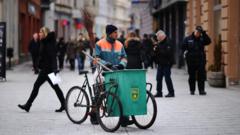More than 8,000 Bosnian men and boys were killed by Bosnian Serb forces in Srebrenica during July 1995, an event still marked by silence and unresolved tension. In Sarajevo, the world premiere of "Flowers of Srebrenica" took center stage, depicting the grim reality of the massacre and the continuing divisions within Bosnia and Herzegovina. The Srebrenica massacre is recognized as one of the most significant war crimes in Europe since World War Two, where Bosniaks sought refuge under UN protection but were instead subjected to horrific violence.
General Ratko Mladić of the Bosnian-Serb forces, who oversaw the systematic murder of the victims, has left a legacy of pain that still haunts the families of the deceased. Many victims were identified through clothing or personal items as their bodies were dumped in mass graves, later exhumed and reburied across multiple sites, complicating the grieving process for families still searching for their loved ones.
While those in Sarajevo remember and commemorate the tragedy, in the majority-Serb entity of Republika Srpska, political leaders deny that genocide occurred at Srebrenica, disregarding international tribunal rulings. Efforts to remember and heal from the past are further complicated by current political tensions, with leaders like Milorad Dodik stirring conflict by pushing for increased autonomy from national institutions.
In Sarajevo, public displays urging people to "Remember Srebrenica" contrast sharply with the absence of remembrance in East Sarajevo, reflecting deep-seated ethnic divides. Some political figures argue that focusing solely on victims from one ethnic group perpetuates divisions rather than fostering reconciliation.
As commemorative events unfold, thousands gather at memorial sites, demonstrating solidarity with those affected. Yet, many individuals, like Mirela Osmanović, express concerns over the rise in ethnic tensions fueled by political leaders, fearing a return to the hostile environment of the 1990s.
For those living in the shadow of Srebrenica, healing remains an elusive goal amidst ongoing political maneuvering and the complex legacy of a dark chapter in history.
















